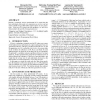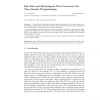5 search results - page 1 / 1 » Elitism reduces bloat in genetic programming |
GECCO
2008
Springer
13 years 6 months ago
2008
Springer
Elitism is commonly used in generational GP to ensure that the best individuals discovered in a generation are not lost, and are made available for possible further improvements t...
EC
2006
13 years 5 months ago
2006
Genetic programming has highlighted the problem of bloat, the uncontrolled growth of the average size of an individual in the population. The most common approach to dealing with ...
GPEM
2000
13 years 5 months ago
2000
Abstract. Size fair and homologous crossover genetic operators for tree based genetic programming are described and tested. Both produce considerably reduced increases in program s...
CEC
2005
IEEE
13 years 11 months ago
2005
IEEE
The most controversial part of genetic programming is its highly disruptive and potentially innovative subtree crossover operator. The clearest problem with the crossover operator...
GECCO
2004
Springer
13 years 11 months ago
2004
Springer
A new graph-based evolutionary algorithm named “Genetic Network Programming, GNP” has been proposed. GNP represents its solutions as directed graph structures, which can improv...


